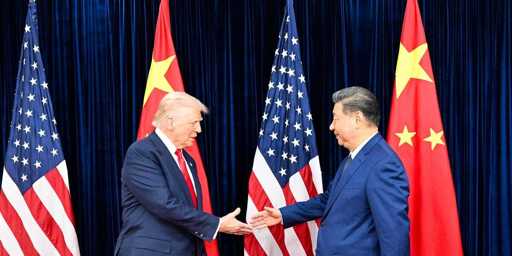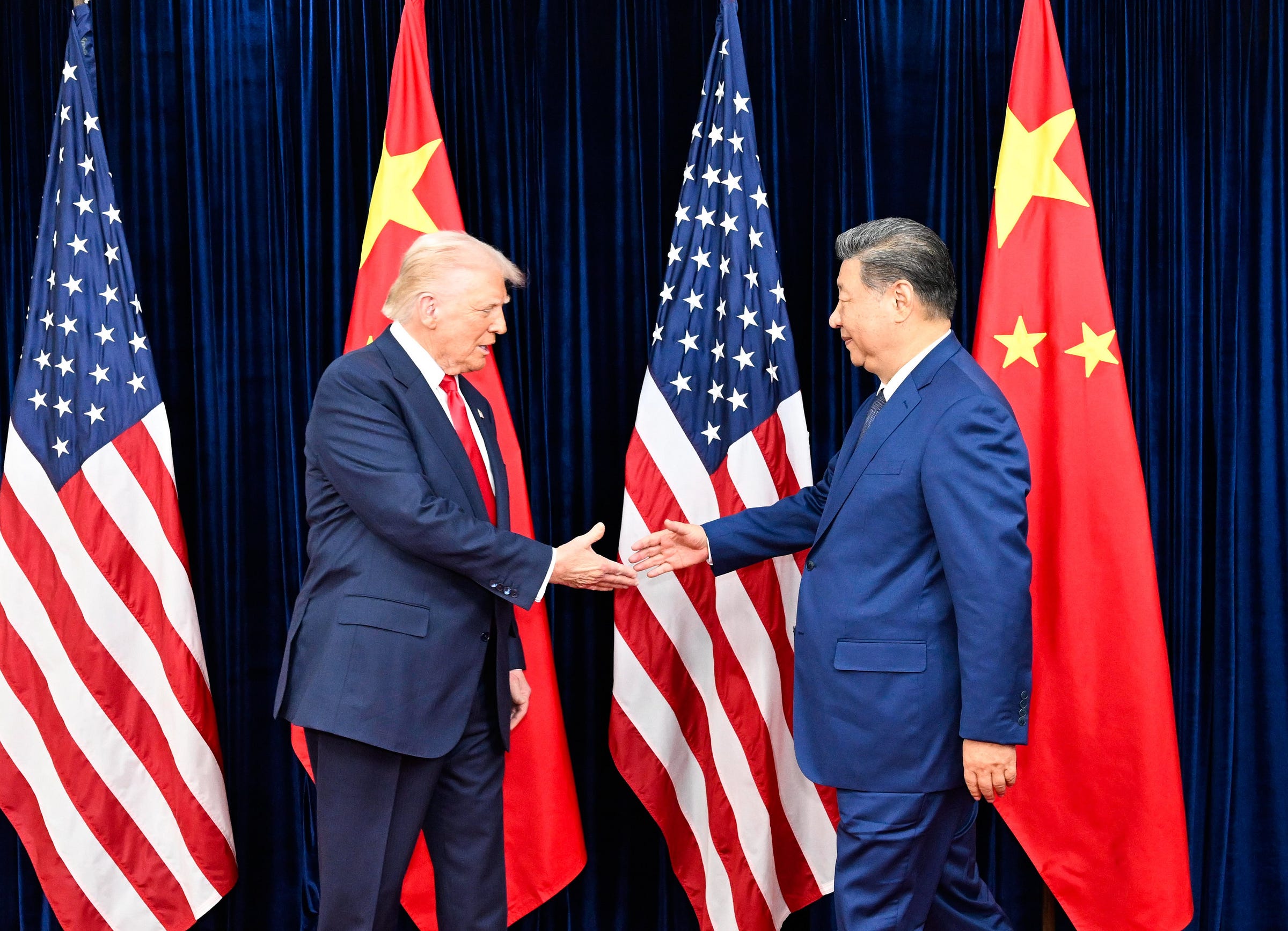Israel continues to violate the Gaza ceasefire, bombing Khan Younis and Beit Lahia. Qatar’s Prime Minister Mohammed bin Abdulrahman Al Thani suggests Hamas breached the ceasefire with an attack in Rafah that killed an Israeli soldier. Hamas says Israel is deliberately collapsing the agreement and seeking to impose new terms through violence, as it has “done before in Lebanon and Gaza.” Israeli troops and armored vehicles conduct an overnight incursion into a southern Lebanon town. Google and Amazon secretly accept extraordinary conditions to secure Israel’s $1.2 billion Project Nimbus cloud deal, according to a joint investigation by +972 Magazine. The U.S. Federal Reserve lowers its benchmark interest rate by a quarter point, citing risks to employment and uncertainty caused by the still-ongoing government shutdown. The Department of Homeland Security announces it will require biometric data from all departing noncitizens at every official exit point beginning December 26, according to Migrant Insider. U.S. War Secretary Pete Hegseth confirms another strike on a vessel in the Caribbean—the fourteenth since September. Sudan’s Rapid Support Forces execute over 460 hospital patients and their companions in the newly seized city of El-Fasher in Darfur. Myanmar’s Ta’ang National Liberation Army signs a ceasefire with the junta government, while fighting continues along the Afghanistan-Pakistan border. President Donald Trump meets with Chinese President Xi Jinping in South Korea.
This is Drop Site Daily, our new, free daily news recap. We send it Monday through Friday.
Demand Israel immediately lift its ban on foreign journalists. For more than two years, Israel has maintained a complete blockade on foreign press access to Gaza—the longest and most complete media ban of any modern conflict.
We call on the Israeli government to:
Grant immediate, independent access to Gaza for all foreign journalists without military escorts, pre-broadcast censorship, or restrictions on movement and reporting.
End the deliberate targeting and killing of journalists covering this conflict and allow humanitarian organizations to protect and support press workers.
Chinese President Xi Jinping meets with U.S. President Donald Trump in Busan, South Korea, Oct. 30, 2025. (Photo by Shen Hong/Xinhua via Getty Images)
The Genocide in Gaza
The Israeli military is continuing to bomb Gaza with around 10 air strikes on Khan Younis in southern Gaza on Thursday, according to Al Jazeera, which reported that one of the strikes destroyed the electricity company building in the town of Abasan east of Khan Younis city. Israel also bombed Beit Lahia in northern Gaza on Wednesday, killing at least two Palestinians. The strikes come after the Israeli military announced it had “returned to the [ceasefire] agreement” following a wave of bombardment overnight Tuesday that killed over 100 Palestinians, including over 40 children.
United Nations Human Rights Chief Volker Turk condemned the Israeli attacks on “residential buildings, IDP tents and schools across the Gaza Strip…appalling” and called for an immediate end to actions endangering civilians or violating the ceasefire. UN Secretary-General António Guterres urged all parties to uphold the truce and praised Egypt, Qatar, Türkiye, and the United States for mediating efforts to sustain it.
The director of the Medical Relief Association in Gaza said roughly 350,000 diabetic patients are receiving no medical follow-up as a result of the collapse of the enclave’s health system in the war. He added that the sector has lost 40% of kidney patients due to severe shortages of treatment and dialysis supplies. The official called on the international community to pressure Israel to allow patients to leave Gaza for lifesaving care.
Gaza’s Government Media Office said that bodies of 120 Palestinians returned to Gaza by Israel under the ceasefire deal were missing eyes, corneas, and internal organs, alleging systematic organ theft and calling for an international investigation. Director Dr. Ismail al-Thawabta said the corpses also bore signs of torture and execution. Israel denies the claims, though Novara Media and rights groups note that similar allegations date back decades, including admissions by Israeli pathologists of non-consensual organ removal from the 1990s.
Zakaria Bakr, head of the Gaza Fishermen’s Union, said Israeli forces have arrested more than 40 fishermen over recent months, most of whom were freed under the latest prisoner exchange deal. 11 remain in Israeli detention, he added, as Gaza’s fishing industry continues to face heavy losses and restrictions amid the ongoing blockade.
Ceasefire Updates
Speaking at the Council on Foreign Relations, Qatari Prime Minister Sheikh Mohammed bin Abdulrahman Al Thani said the ceasefire breach began with “a violation by the Palestinian party,” referring to an attack on Israeli soldiers in Rafah, and said Qatar expected an Israeli “response.” He told journalist Ayman Mohyeldin that Hamas denied involvement but Doha had not verified the claim, adding that Qatar is working “in full coordination with the United States” to keep the truce intact.
Al Thani said Doha is pressing all Palestinian groups “to get to a point where they acknowledge that they need to disarm,” describing disarmament and decommissioning as integral parts of the ceasefire agreement. He said that future talks will focus on managing the “complicated” issue of the resistance’s weapons, adding that the goal is to ensure safety for both Palestinians and Israelis while creating “a political horizon for the Palestinian people” and establishing a single Palestinian agency to hold legitimate arms.
Asked by Ayman Mohyeldin whether Qatar believes the U.S. knew in advance about Israel’s strike on Doha, Al Thani said his government “respects” Washington’s denial but noted the attack left the region feeling “betrayed.” He said Israel bombed an active mediation site in a residential area surrounded by schools and embassies, killing a Qatari security official who had previously served at the U.S. embassy—the first Gulf Cooperation Council national killed by Israel. Al Thani added that several other delegations, including Colombian and Rwandan mediators, were meeting nearby, calling the strike one that “affected the heart of the region’s security structure.”
Hamas said the renewed Israeli assaults on Gaza show a deliberate attempt to collapse the ceasefire agreement and impose new terms through violence. The group accused Israel of acting with “American collusion,” saying U.S. support provides Prime Minister Benjamin Netanyahu’s government with political cover to continue what it called “crimes” against the Palestinian people.
French Foreign Minister Jean-Noël Barrot said France is dispatching a joint civilian-military team with the U.S.-led Civil-Military Coordination Center (CMCC) to plan Gaza’s post-war phase. The CMCC includes about 200 U.S. troops and personnel from France, Australia, Spain, the UAE, and elsewhere, coordinating humanitarian aid, logistics, ceasefire monitoring, and security. Barrot said France’s forces will not enter Gaza but will assist from Israel’s territory, adding that Paris and Washington are working at the UN in New York to secure a mandate for an international stabilization force in Gaza.
West Bank and Israel
Since Israel’s war on Gaza began, Israel has erected nearly 1,000 barriers in cities and towns in the occupied West Bank, further stifling movement for Palestinians and hindering daily lives, according to the Colonization and Wall Resistance Commission, an official Palestinian governmental body. The 916 new gates, barriers, and walls that have been installed are at village and town entrances and between cities, and the gates have erratic opening hours, with some staying shut for days.
Israeli soldiers and settlers are continuing to intensify raids and attacks across the occupied West Bank, according to Palestinian state news agency Wafa, including in the town of Qabatiya and the village of Anza, south of Jenin; storming the town of Turmus’ayyer, north of Ramallah; cutting down olive trees belonging to three villages south of Nablus; and storming a Bedouin village in the al-Hathroura area, east of Jerusalem.
Israeli forces detained six Palestinian journalists Wednesday while they were reporting in the northern Jordan Valley. Those held were identified as Fadi Yassin, Abboud Al-Zagloul, Laith Ja’ar, Walaa Fattayer, Muath Ghanam, and Jamil Bsharat. Local reports added that journalist Laith Ja’ar was arrested separately while covering events in Ain al-Hilweh.
Leaked Israeli Finance Ministry documents obtained by +972 Magazine, Local Call, and The Guardian show that Google and Amazon secretly accepted extraordinary conditions to secure Israel’s $1.2 billion Project Nimbus cloud contract. The companies reportedly agreed to remove all usage restrictions and to quietly alert Israeli authorities—through coded “wink” payments—if foreign courts sought access to data. The seven-year deal grants Israel unrestricted use of AI and cloud services, including during its war in Gaza, while preventing the firms from suspending service even in cases of human-rights violations. Legal experts told reporters the covert “winking mechanism” could breach U.S. law and reflects how both corporations surrendered oversight for profit. Read +972 Mag’s full report here.
The Israeli army has launched a criminal investigation into the leak of surveillance footage from the Sde Teiman detention camp showing a Palestinian detainee—blindfolded, handcuffed, and restrained—being raped for roughly 15 minutes by Israeli reservists. The probe targets alleged whistleblowers within the Military Advocate General’s office who may have provided the video to Channel 12, rather than the perpetrators themselves. Israel’s chief military prosecutor, Maj. Gen. Yifat Tomer-Yerushalmi, has taken leave amid the fallout. Prosecutors had previously indicted five reservists for “severe abuse” at Sde Teiman that left one detainee with broken ribs, a punctured lung, and a torn rectum, sparking protests outside military bases as civilians rallied in defense of the accused soldiers.
U.S. News
The Federal Reserve lowered its benchmark interest rate by a quarter point to a range of 3.75–4 percent, its second consecutive cut, citing rising risks to employment and uncertainty caused by the month-long government shutdown. Federal Reserve Chair Jerome Powell said policymakers were sharply divided over future moves, emphasizing that another cut in December was “far from” guaranteed. President Donald Trump, speaking in South Korea, derided Powell as “too late” in reducing rates and continues to push for deeper cuts to fuel growth. The Fed’s decision came amid layoffs at major firms such as Amazon and UPS, and an August unemployment rate of 4.3 percent—the highest since 2021. Inflation remains near 3 percent, limiting the Fed’s flexibility. Powell warned that with official data disrupted by the shutdown, the central bank may have to rely on private reports to guide policy as it confronts a slowing, inflation-pressured economy.
The Congressional Budget Office said the ongoing federal shutdown will cost the U.S. economy between $7 billion and $14 billion, cutting fourth-quarter growth by up to two percentage points as 750,000 federal workers miss paychecks and food benefits halt. CBO Director Phillip Swagel said most losses will reverse once the government reopens, though furloughed work hours will permanently reduce real GDP.
The Senate voted 50–46 to end the national emergency President Donald Trump used to impose tariffs on Canadian imports, with four Republicans joining Democrats in support. The measure is unlikely to take effect, as the House previously blocked all legislation challenging Trump’s tariffs until March 2026. The vote followed a similar bipartisan move against tariffs on Brazilian goods, underscoring congressional frustration over Trump’s trade policies, which critics say stretch emergency powers and raise costs for American consumers and businesses.
Former Sangamon County Sheriff’s Deputy Sean Grayson was convicted of second-degree murder for fatally shooting 36-year-old Sonya Massey, an unarmed Black woman who had called 911 to report a prowler at her Springfield home in July 2024. The killing, captured on body camera, sparked statewide protests, forced the county sheriff’s resignation, and led Illinois Governor JB Pritzker to tighten police hiring laws. Grayson faces up to 20 years in prison at sentencing in January.
The Department of Homeland Security finalized a rule on October 27 requiring biometric data collection—such as fingerprints and facial scans—from all departing noncitizen travelers at every official U.S. exit point beginning December 26. The rule expands what had been limited pilot programs into a nationwide system covering airports, seaports, and land crossings, aimed at curbing visa overstays and tightening border tracking. DHS is accepting public comments through November 26, including on privacy safeguards and the costs of deploying biometric systems at smaller or newly designated departure points. Read more from Migrant Insider here.
Former New York Governor Andrew M. Cuomo earned nearly $5 million through his consulting firm Innovation Strategies in 2024, but his refusal to identify the clients paying him has raised transparency and ethics concerns as he campaigns for mayor, according to the New York Times. By routing payments through his firm, Cuomo avoided disclosing individual clients—among them reportedly the cryptocurrency exchange OKX, which later pled guilty to U.S. money-laundering charges, and Nano Nuclear Energy, which granted him stock options now worth over $5 million. His campaign insists the work was legal and ended before his run, but watchdogs warn that secrecy about corporate clients with active business interests could create serious conflicts for a prospective mayor.
A new analysis from Brown University’s “Costs of War” project finds that President Donald Trump’s “One Big Beautiful Bill Act” funnels vast sums to private military contractors with limited oversight, converting $156 billion in annual Pentagon and defense funding into what researchers call a “slush fund” for the industry. By shifting defense spending into the mandatory budget process, lawmakers effectively insulated the Pentagon from normal scrutiny, enabling indefinite increases through 2029. Major firms including Boeing, Lockheed Martin, Honeywell, Amazon, and RTX are expected to receive billions in new drone and AI contracts, as defense lobbyists—who spent $157 million last year—capitalize on the act’s closed-door funding structure. The Lever have additional details here.
Progressive Democrat Kat Abughazaleh, a social media figure running for an open House seat in Illinois, was federally indicted for allegedly impeding federal officers during a September protest at the Broadview ICE detention center near Chicago. The indictment accuses her and others of surrounding and damaging a government vehicle, though Abughazaleh’s own video shows protesters placing their hands on the car as it moved forward. She called the charges a “political prosecution” by the Trump administration meant to “silence dissent,” while fellow candidate Evanston Mayor Daniel Biss called them “frivolous” and part of a broader attempt to criminalize protest.
Virginia Giuffre’s posthumous memoir Nobody’s Girl is generating new fallout for Prince Andrew, who is reportedly at risk of losing his royal residence. In the U.S., the book has renewed calls to release the full Epstein files, which Giuffre said include the name of a “well-known prime minister” who brutally assaulted her. Drop Site contributor Rhana Natour examines Giuffre’s legacy and the broader reckoning over the Epstein network in a video available here.
International News
The World Health Organization said Sudan’s Rapid Support Forces (RSF) executed more than 460 patients and their companions inside a Saudi Hospital after seizing El-Fasher, the capital city of North Darfur. Amid the takeover of El-Fasher, the RSF also raided nearby homes where civilians were shot, tortured, and raped. Satellite imagery from Yale confirmed mass graves near hospitals and detention centers, as over 36,000 residents fled the fighting and siege. A statement from the UN condemned the assault as “one of Sudan’s worst massacres” and detailed a wider pattern of violence against medical facilities—185 attacks verified since April 2023, including 49 this year that killed 966 people. The UN urged all parties to halt hostilities and guarantee humanitarian access amid what aid groups are calling “hell on Earth.”
U.S. War Secretary Pete Hegseth confirmed another strike on an alleged drug-smuggling vessel in the Eastern Pacific—the fourteenth operation since September. The attack killed four people, bringing the total deaths to more than 60, with Hegseth calling it a “lawful action to protect American interests.” Rights groups are demanding evidence and a legal justification for what they describe as an undeclared campaign of extrajudicial maritime killings.
President Trump met Chinese President Xi Jinping yesterday in Busan, South Korea, during the APEC Summit, marking their first in-person meeting since Trump’s return to office. Following the meeting China agreed to a one-year pause of new rare earth export controls introduced earlier this month, easing immediate tensions on global supply chains. Restrictions imposed in April—which had already disrupted automakers and other industries—remain in place, leaving key limits on exports of rare earths and magnets critical to defense and technology sectors.
Israeli forces conducted an overnight incursion into the village of Bilda in southern Lebanon, raiding a municipal government building and killing an employee, according to Lebanese state media. The Israeli military confirmed the attack. In response, Lebanese President Joseph Aoun instructed the commander of the army to confront any Israeli incursion in the south. Israel also carried out air strikes on Mahmoudiyeh and Jarmak in southern Lebanon on Thursday.
U.S. envoy Tom Barrack reportedly told Lebanese leaders that time is running out to begin direct negotiations with Israel aimed at disarming Hezbollah, warning that, if Beirut refuses, Israel could “move to disarm Hezbollah by force” without U.S. intervention, al-Akhbar reported. Barrack’s visit—his final before transferring the Lebanon portfolio to incoming ambassador Michel Issa—comes as Israeli strikes have killed more than 320 people since the November 2024 truce. Washington blames the weak ceasefire on the absence of a direct agreement between Israel and Hezbollah, while Lebanese officials warn that forced disarmament could trigger wider instability. Barrack—alongside fellow envoy Morgan Ortagus, and Egyptian intelligence chief Hassan Rashad—is urging Beirut to join border and security talks as Israel continues near-daily attacks and maintains positions in six areas along the Blue Line.
The U.S. has informed NATO allies it will withdraw a combat brigade from Europe’s eastern flank, marking the first step in President Donald Trump’s plan to scale back U.S. forces on the continent, including roughly 3,000 troops stationed across Romania, Bulgaria, Hungary, and Slovakia. The rotation will end without replacement, though about 1,000 personnel will remain in Romania. U.S. officials described the move as part of a “balanced force posture,” not a retreat from NATO, but it has unsettled allies already nervous about Washington’s shifting priorities toward the Indo-Pacific. Congressional Republicans criticized the Pentagon for failing to consult lawmakers, while NATO leaders urged coordination as Europe braces for reduced U.S. presence amid Russia’s ongoing war in Ukraine.
The Elders, a group of former world leaders founded by Nelson Mandela, called for the immediate release of Marwan Barghouti from Israeli prison, describing him as “the Palestinians’ Mandela” and a unifying figure essential to restarting the two-state process. In their October 29 statement, the group urged President Donald Trump to use the Gaza ceasefire as an “opportunity” to press for Barghouti’s freedom, while condemning Israel’s renewed airstrikes on Gaza City as a “flagrant violation” of the deal and its obstruction of humanitarian aid. The Elders also denounced Israel’s torture and arbitrary detention of prisoners, endorsed President Mahmoud Abbas’s pledge to hold free elections within a year, and noted that even former Israeli security officials have supported Barghouti’s release.
During the UN General Assembly’s Third Committee session, Israel’s UN ambassador Danny Danon called UN Special Rapporteur Francesca Albanese a “witch.” Albanese responded by calling the attack “delusional,” adding, “If I had the power to make spells, I would use it to stop your crimes and make sure those responsible end up behind bars. And I would use it to make sure that everyone from the river to the sea . . . lived in freedom and enjoyed their rights, not just privilege for a few,” she said.
The U.S. lifted sanctions on Bosnian Serb politician Milorad Dodik and his family, reversing penalties imposed in 2022 over corruption and separatist actions that Washington said threatened Bosnia’s stability. The U.S. Treasury Department’s Office of Terrorism and Financial Intelligence published the notice Wednesday without explanation, marking a sharp policy shift welcomed by Dodik, who thanked President Donald Trump for “correcting a grave injustice.” Dodik, a pro-Russian Bosnian Serb nationalist, recently stepped down as president of Republika Srpska after being banned from politics. He has long called for the Serb-run entity to secede from Bosnia and unite with Serbia, defying the U.S.-brokered Dayton peace accords.
Myanmar’s Ta’ang National Liberation Army (TNLA) signed a China-mediated ceasefire with the country’s military after months of fierce fighting near the Chinese border, the group announced Wednesday. The deal, reached in Kunming, calls for the TNLA to withdraw from several captured towns in exchange for an end to government airstrikes and ground offensives. The agreement marks a key victory for Myanmar’s junta ahead of December elections widely viewed as an effort to legitimize continued military rule.
Two Syrian soldiers were killed and another seriously wounded near the Tishrin Dam after being hit by a guided missile, according to Syria’s defense ministry. Damascus blamed the Syrian Democratic Forces (SDF), accusing them of violating a ceasefire reached earlier this month, while the SDF denied responsibility and said landmines caused the explosion. The clash highlights ongoing friction between the Kurdish-led administration and the Syrian government despite their March agreement to integrate Kurdish institutions into the state.
At least six Pakistani soldiers, including a captain, and seven Tehrik-e-Taliban Pakistan militants were killed in an operation near the Afghan border, the military said. Pakistan’s Inter-Services Public Relations described the fighting in Kurram district as an “intelligence-based operation” against “Indian-sponsored Khawarij,” its term for the TTP. The clashes follow similar fighting days earlier that left five soldiers and 25 militants dead, amid rising cross-border apprehension after failed Pakistan–Taliban talks in Istanbul.
Director General of the International Atomic Energy Agency (IAEA) Rafael Grossi said Iran does not appear to be enriching uranium but inspectors have detected renewed movement at nuclear sites they can no longer fully access. Grossi told the AP the IAEA must confirm that the country’s 60% enriched uranium stockpile—enough for up to ten bombs—remains secure. He said recent U.S. and Israeli strikes severely damaged but did not destroy Iran’s key facilities, complicating efforts to restore cooperation after the Cairo agreement to relaunch inspections.
For the 33rd year, the United Nations General Assembly voted overwhelmingly to end the U.S. economic embargo on Cuba, adopting the resolution 165–7 with 12 abstentions. The United States and Israel were joined this year by five additional countries—Argentina, Hungary, North Macedonia, Paraguay, and Ukraine—in opposing the measure, following U.S. lobbying that included claims that up to 5,000 Cubans are fighting alongside Russian forces in Ukraine. Cuban Foreign Minister Bruno Rodríguez called the embargo a “policy of collective punishment,” while U.S. envoy Mike Waltz dismissed the annual vote as “political theatre.” The embargo, in place since the Cold War, can only be lifted by Congress.
More From Drop Site
ON-THE-GROUND REPORTING FROM GAZA: Drop Site contributor Abdel Qader Sabbah documents the aftermath of Israeli airstrikes in the Nuseirat refugee camp in central Gaza, including the twin bombing of a family home that killed at least eleven members of the Abu Dalal family, including four children. The strikes were part of a massive wave of Israeli airstrikes and tank fire across the enclave that killed at least 104 Palestinians, including 46 children, in less than 12 hours. In Nuseirat on Wednesday morning, the Al-Awda Hospital was packed with mourners after the hospital received at least 30 bodies alone. Mass funerals were held with hundreds in the streets holding funeral prayers for the Abu Dalal family and others, their bodies wrapped in white body bags and piled onto trucks. Read Abdel Qader’s latest with accompanying video here.
Programming note: You can sign up here to get updates from us on our WhatsApp channel.
If you want to continue getting this newsletter, you don’t have to do anything. But if this is too much—we do try to be mindful of your inbox—you can unsubscribe from this newsletter while continuing to get the rest of our reporting. Just go into your account here at this link, scroll down, and toggle the button next to “Drop Site Daily” to the off setting. It looks like this:
From Drop Site News via this RSS feed





